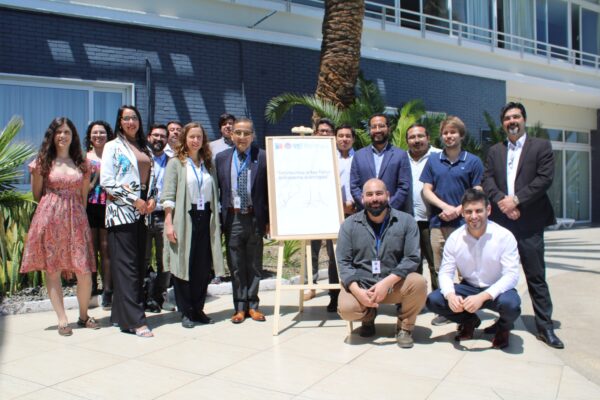The Ministry of the Environment, in collaboration with the Ministry of the Economy, delivered the results of the Public Baseline regional competition (LBP), which was awarded in the Region to the University of Antofagasta.
In an event held in the Baquedano room in the Antofagasta Hotel, this Friday, November 22, the team of the Ministry of the Environment – led by the Head of the Department of Environmental and Economic Information – Víctor Caro, in a company of various local authorities, has officially announced the award of the Regional Public Lines Competition (LBP) to the University of Antofagasta.
This initiative, which allows a detailed study of the environmental elements of the area, aims to turn it into a public good that collaborates for development with high environmental standards, for example, for various investment and research projects.
The Minister of the Environment, Maisa Rojas, appreciated the signing of this important interministerial working agreement with the University, who pointed out that “today we are facing one of the best environmental and economic news we can give it to the Department of Antofagasta. , because reliable primary environmental information – in an area with data as relevant as this area – is the basis for sustainable development and, therefore, for the social well-being of its inhabitants.”
Similarly, the Ministry of Economy highlighted the importance of this public policy which has an investment of around $1,000 million pesos, ensuring that “andThese LBPs for the Region of Antofagasta will provide certainty and better environmental information to install businesses that are strategic for sustainable growth and decarbonization. The work carried out by the University of Antofagasta will allow free access to relevant information for investments in the sector, for example, regarding lithium and green hydrogen, making the treatment of environmental assessment more flexible,” said the Minister of Economy, Nicolás. Grau, about the campaign which was funded through the Sustainable Productive Development Program (DPS) which leads its portfolio.
At the same time, from the University of Antofagasta they said “as a regional university, we know how important it is to have clear and accessible data to develop projects that directly benefit the community. Not only does this data support the decisions of authorities and companies, but it is also essential to ensure that our activities respect and enhance the environment in which we live.
This project is a great example of what we can achieve when we work together. From our university, we celebrate this initiative with enthusiasm, as it reinforces our mission to contribute to the sustainable development of Antofagasta, balancing the economic, social and environmental needs of our land,” said the Rector Marcos Cikutovic.
With this milestone, Antofagasta will become the second region in the country (after Magallanes and waiting for the Metropolitan Region) to start the work of collecting environmental data, which will be public, open and which includes primary sources and secondary sources of information.
The day included a workshop that allowed the main actors of Antofagasta to present and recover the Public Baselines program, as well as field trips in the previous days to some of the main ecosystems and areas interesting, such as Paposo, Taltal, Mussels and Tocopilla.
More information at https://lineasdebasepublicas.mma.gob.cl.
2024-11-25 14:10:00
#Ministry #Environment #launches #Antofagasta #Public #Baseline
What specific mechanisms will be implemented to address potential concerns about data privacy and security, particularly with regard to sensitive environmental information?
## Interview: Unveiling Antofagasta’s Environmental Future with Public Baseline Data
**Introduction**
Welcome to World Today News. Today we’re discussing the exciting launch of the Public Baseline regional competition (LBP) in Antofagasta, Chile. This initiative, spearheaded by the Ministry of the Environment and the Ministry of the Economy, promises to revolutionize environmental data accessibility and drive sustainable development. To delve deeper, we have two esteemed guests:
* **Dr. Maria Sanchez:** Researcher at the University of Antofagasta, leading the LBP project team.
* **Mr. Pablo Gonzalez:** Regional Director of the Ministry of Economy for Antofagasta.
Let’s begin!
**Section 1: The Significance of Open Data (5-7 minutes)**
* Dr. Sanchez, can you elaborate on the significance of this project for the University of Antofagasta and the region? This data will be open to the public – why is that crucial?
* What kinds of projects or research do you foresee benefiting most from this open access environmentals data? Will this data empower local communities to participate more actively in environmental decisions?
* Mr. Gonzalez, from an economic development standpoint, what are the key strengths of having easily accessible and reliable environmental data? How can this drive investment and innovation?
**Section 2: Collaboration and Sustainable Development (5-7 minutes)**
* Mr. Gonzalez, this project is a collaboration between the Ministry of Environment and the Ministry of Economy. What does this say about the government’s commitment to balancing environmental protection with economic growth?
* Dr. Sanchez, how will the University of Antofagasta ensure the quality and accuracy of the collected data? What steps are being taken to involve local communities and stakeholders in the data collection process?
* Dr. Sanchez, can you give specific examples of industries that could benefit from this data – potentially even emerging industries like green hydrogen?
**Section 3: Looking Ahead – The Future of Environmental Management (5-7 minutes)**
* Dr. Sanchez, with the success of the LBP program in Antofagasta, what are the future plans for expanding this initiative to other regions of Chile? What are the biggest challenges you anticipate in scaling up the project?
* Mr. Gonzalez, how does this project align with Chile’s national sustainability goals? What message does this project send to the international community about Chile’s commitment to environmental transparency and sustainable development?
**Closing Remarks**
Thank you both for your insightful perspectives. This project exemplifies the power of data sharing and collaboration in creating a more sustainable future for Antofagasta and Chile.
We encourage our viewers to learn more about the Public Baseline project and explore the vast amounts of information that will become freely available: https://lineasdebasepublicas.mma.gob.cl/.|


